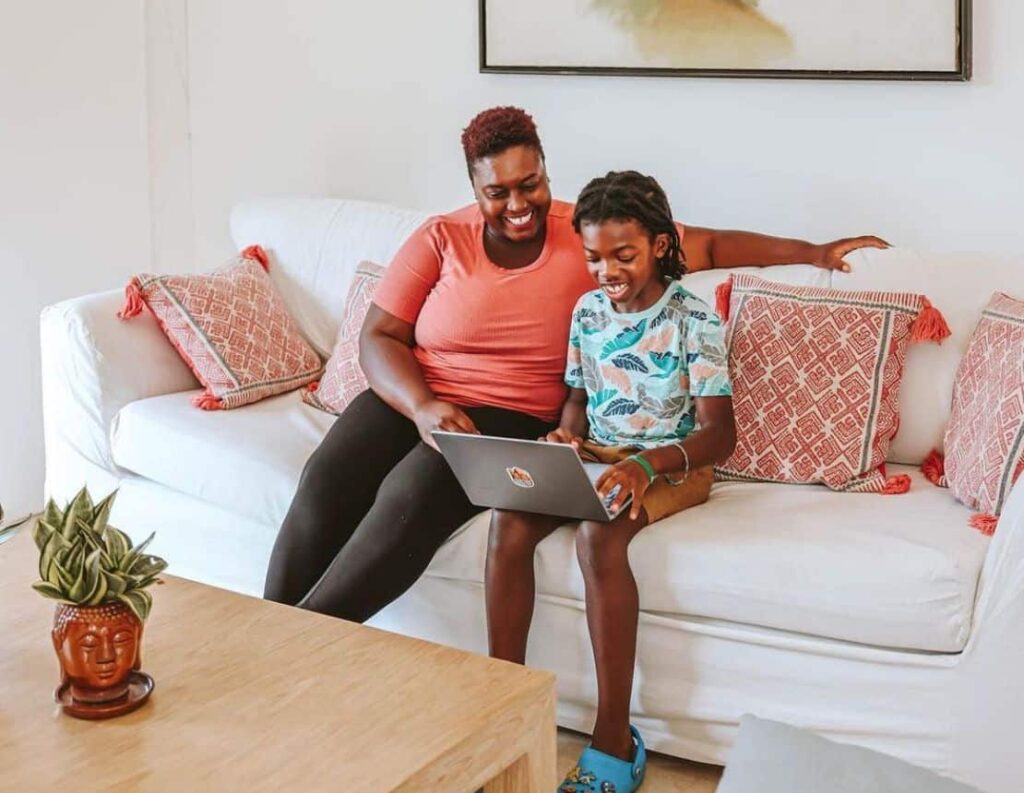
This post may contain affiliate links. By clicking on any of the links below, I may get a commission if you make a purchase at absolutely no additional charge to you. This helps offset the costs of running this blog & I appreciate your support. Please see my privacy & disclosure policy for more.
Table of Contents
Homeschooling has been a game changer for our family. We would not be able to travel the world and have so many incredible experiences if we relied on traditional schooling.
There are a lot of factors to consider before starting homeschooling. In fact, homeschooling laws and requirements are different for each state. I’ve written a post on homeschooling in California, but there are several components of homeschooling in Florida that make it unique.
Homeschooling or home education is popular in Florida. In fact, a lot of families in Florida choose to homeschool their kids and are happy with their decision. However, a home education program isn’t for everyone.
If you’re considering homeschooling in the state of Florida, this post is for you. My goal is to guide you on how to start your homeschooling journey in Florida in hopes that you can have a positive homeschool experience.

How To Homeschool in Florida
Step 1: Research.
The first step to homeschooling in Florida is getting to know the laws and various methods and curriculum options. With enough research, the transition from traditional public or private schooling to homeschooling will be an easy one.
The laws and regulations for homeschooling vary by state. Some states require homeschool families to notify a government agency when they decide to withdraw their children from public school. In fact, other states have minimum education requirements for parents or require them to receive a certification.
You will need to familiarize yourself with your state’s homeschooling laws before making an official decision about homeschooling. I go into the details of Florida homeschooling laws later in this post.
During the research process, you’ll also want to consider the various options for homeschooling curriculum and methods. There are several great homeschool curriculum programs and methods available, making it easy to find the one that will work best for your child.
Step 2: Decide on a homeschooling method.
After thoroughly researching the different methods of homeschooling, you’ll also need to decide which method you’re going to carry out. There are a ton of resources available online, like course materials, e-books, and videos.
If your child is old enough, I recommend discussing how they learn best or which learning techniques they prefer. Also, consider what kind of curriculum would work best for your family. Perhaps you prefer a lenient schedule with more flexibility. Or, maybe your child would do better with a more structured homeschooling method.
Flexibility is important when you first begin homeschooling. It may also take some trial and error to find a method that works best for you and your student.
Step 3: Begin homeschooling.
One of the benefits of homeschooling is that you can start whenever you want. Although it’s often easiest to begin homeschooling in August, for various reasons, it isn’t always preferable.
As a parent, you have to withdraw your student from their current school. Some states also require you to notify a government agency. If you plan on homeschooling under the Florida statute for home education, you’ll have to submit a letter of intent (more on this later) before you can officially begin homeschooling.

Requirements For Homeschooling in Florida
According to the Florida Homeschool Association, there are four legal requirements for homeschooling in Florida. All homeschool parents must meet these requirements to legally homeschool in the state of Florida.
Submitting a notice of intent to homeschool.
Within 30 days of beginning to homeschool, parents need to file a notice of intent to homeschool (a.k.a. The Letter of Intent). This letter lists the names, addresses, and birth dates of the students who will be joining the homeschool program. The parent needs to sign the letter of intent, and also include the names of any children who will be participating in the home education program and are six years old by February 1st.
You should write and deliver the Letter of Intent to the school superintendent’s office in the school district where you live. And, you only need to submit this letter once, unless you plan to add younger children to your homeschool program in the future.
Here’s a great resource to help you find where to send your letter of intent.
Maintaining a portfolio of records and materials.
Just like how public and private schools maintain records for their students, home educators must also maintain student records.
The portfolio of records and materials is a collection of items, put together by the parent, to represent what each student accomplished during the school year. In addition to serving as a record, it can also demonstrate educational progress. So it should be clear from looking at the portfolio, what your child has mastered that year.
Every homeschool portfolio is different, but each one must include two things: samples of student work and a log of educational activities and reading materials. The samples of work are a collection of the various things your student did over the school year. Work samples can include writings, worksheets, tests, creative projects, and more. The educational log is a list of educational activities, like field trips and classes, as well as reading materials that the child used. Common reading materials are library books, early readers, novels, and plays.
The portfolio should be kept in a safe place for at least two years (two years is required by law). Parents can also choose to show the portfolio to a Florida-certified teacher if they want to perform a homeschool evaluation (see next section). The portfolio also has to be made available to the district school superintendent, in the event that they ask to inspect it by making a written request to the parent with 15 days’ notice.
Submitting an annual evaluation.
Every year, homeschool parents are required to submit an evaluation of each student in their homeschool program to the school superintendent’s office. The evaluation is a separate requirement from the portfolio and serves as a progress report.
When the annual evaluation is due varies, but it’s on or before the anniversary date of when your homeschooling first started. Usually, it’s the date listed on your original letter of intent.
Annual evaluations have to be submitted every year until your student finishes homeschooling, whether by graduating or by discontinuing homeschool. There are five ways to complete the annual evaluation for Florida students who are homeschooled. But parents don’t have to use the same evaluation method every year.
- A Florida-certified teacher, as chosen by the parent, will evaluate the student’s educational progress by reviewing their portfolio and talking with the student.
- The student can take a nationally normed standardized test administered by a certified teacher.
- The student can take a state assessment test offered by a school in the district at the same time that other schools are also being tested.
- A licensed psychologist or school psychologist can evaluate the student.
- A different, valid evaluation method that the parent and school district agree upon.
Submitting a notice of termination.
The final requirement for homeschooling in Florida is submitting a notice of termination or the Letter of Termination. Parents should file a notice of termination within 30 days of completing the homeschool program. In addition, the written notice should list the name, address, and birth date of the student who finished the homeschool program. It should also be delivered to the district school superintendent. Any child who completes a home education program (reached homeschool graduation) or who leaves home education for another reason, must submit this notice. You also need to submit each letter of termination along with an annual evaluation within the same 30-day time frame.
Homeschooling Laws in Florida
- There are three options for homeschooling in Florida:
- Homeschooling under the Florida statute for home education
- Homeschooling under a private school umbrella program or “umbrella school”
- Homeschooling with a private tutor
- School is required for ages 6 to 16
- Notification in the form of a letter of intent is required if you are homeschooling under the homeschool statute.
- There are no teacher qualifications for parents.
- There are no state-mandated subjects.
- Immunizations are not required for homeschooled students.
- Parents are required to provide 180 days of instruction to homeschooled students in Florida.

Accredited Homeschooling Programs in Florida
Digital Academy Of Florida
The Digital Academy of Florida is an accredited homeschooling program that offers:
- Florida-certified teachers
- Honors and Advanced Placement courses
- Many exceptional student services
- Customized English language learner support
- Participation in school district sports, if approved by FHSAA
- Technology access (for those who qualify)
- Virtual and in-person social activities, clubs, and events
- Stride Career Prep for Grades 7–12 providing industry certifications
- Career pathways in business, IT, web development, hospitality, and health
Florida Cyber Charter Academy
Students in Florida can enroll in another accredited homeschooling program, the Florida Cyber Charter Academy. It offers:
- State-approved full-time, online, highly interactive curriculum
- State-certified teachers
- Classes in core subjects, world languages, honors, advanced placement (AP)
- Books and materials for students and learning coach shipped to your front door
- Parent resources, demos, and assistance
- Virtual and in-person monthly social events, statewide
- Customized English language learner support at multiple levels
- Participation in district sports and extracurriculars, if approved by FHSAA
- Flexibility for students demonstrating independent learning in grades 9-12
Miami-Dade Online Academy
Miami-Dade Online Academy is a third option for students looking for an accredited homeschooling program in Florida. It’s a full-time, virtual K-12 academy that offers:
- Flexible pacing
- Curriculum powered by the education experts at Stride K12
- Cutting-edge technology with customized online learning
- Classes in core subjects, world languages, honors, advanced placement (AP)
- Books and materials shipped right to your front door
- State-certified teachers
- Parent resources, demos, and assistance
- Vibrant community including clubs and events
With the above information in mind, you can enjoy all the benefits of homeschooling your child in Florida.
I applaud you for making the decision to homeschool your children. Although it’s definitely not for everyone, it has been a total game-changer for our family.
Hopefully, this post provided you with all the information you need to take the next step and become one of the thousands of homeschooled families in the state of Florida.
To learn more about homeschooling, and to follow along as our family travels the world, visit the blog.
